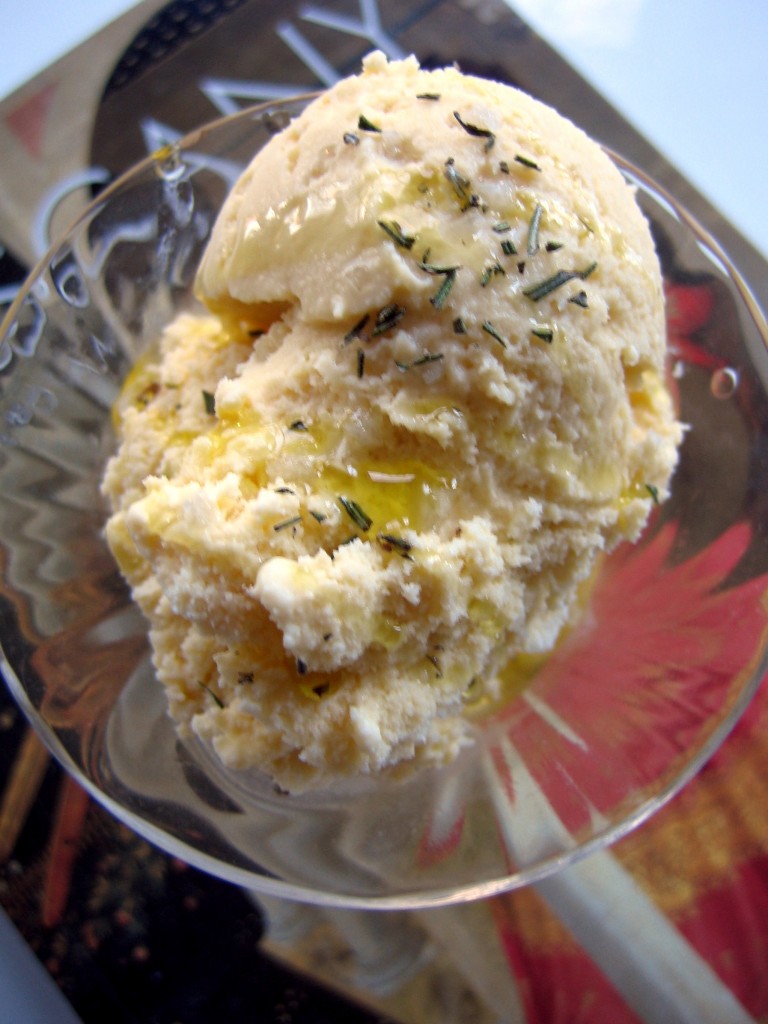
Olive oil and Gelato won’t make it. That’s what you’re thinking, right? They’re one of those couples that would rather bicker and roll their eyes at each other than anything else. They’re just too incompatible. One prefers to savor life, especially long leisurely meals full of good wine and even better conversation. The other, while sweet, prefers life on the go, rarely loitering around for anyone no matter how interesting. How could such a couple ever resolve their differences?
With some quality time in the freezer I say. Continue Reading…
Posted 14 years, 10 months ago at 8:17 am. 7 comments
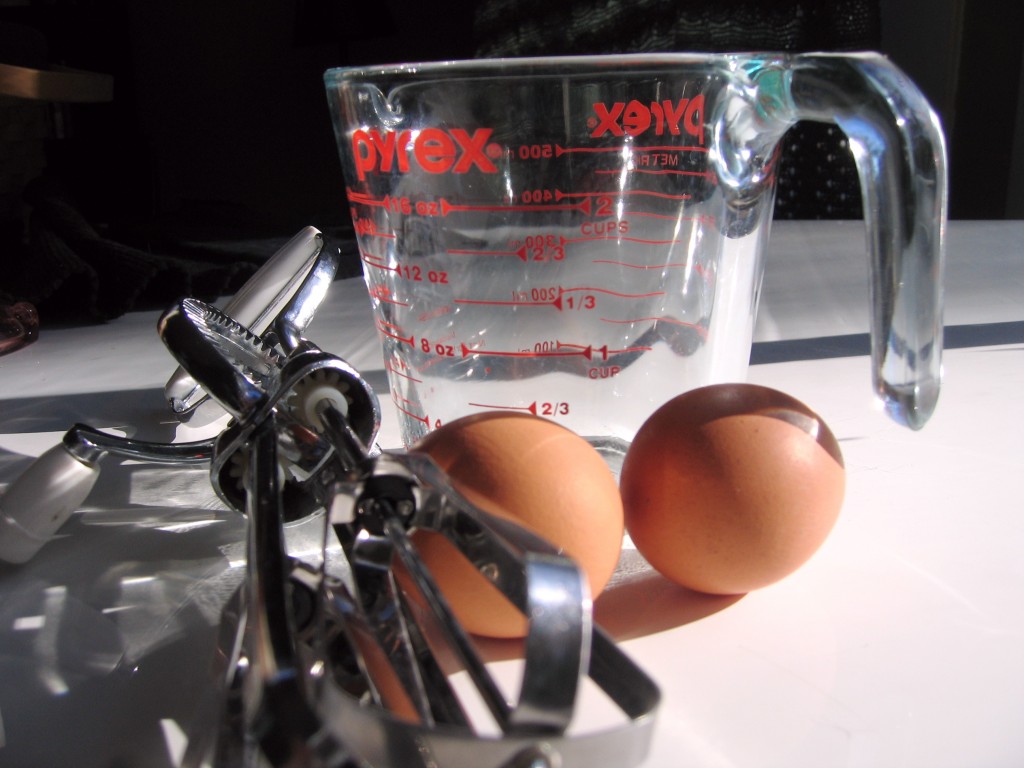
Whirl. Chink. Whirl. Hand cramps.
I must stay here, keep turning-
Thin clear turns thick white.
Posted 14 years, 10 months ago at 3:34 pm. Add a comment
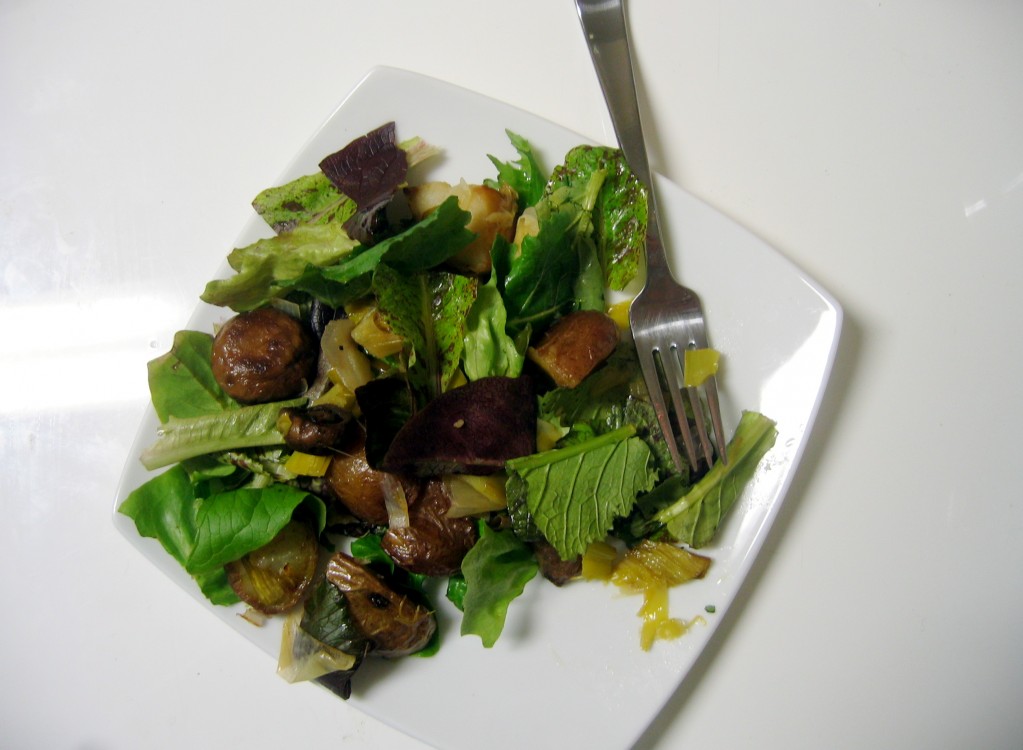
When I was making my menu a few days ago, it was cold and blustery outside. I also had some potatoes that needed to be used. Destiny seemed to be handing me a steaming bowl of Potato and Leek Soup.
But wait, this is Southern Destiny. And what’s that she’s wearing? Short sleeves and sandals? By the time Potato and Leek Soup night rolled around, it was a balmy 70°. I took the potatoes and leeks from Destiny’s hands, but left the soup for another day. Continue Reading…
Posted 14 years, 11 months ago at 6:32 am. 4 comments
This started out as my grandmother’s recipe. But, in the several times I’ve made it, it has become my own. While I keep it traditional for Thanksgiving, I play around with it at other times. It’s a great way to use up stale bread of any kind. It is another recipe that is very adaptable to whatever you can imagine. Play with it. I’ve made a Greek dressing using extra garlic and oregano. Next time I make it, I want to try a Ruben-esque theme- rye bread, caraway seeds, and corned beef. Continue Reading…
Posted 15 years ago at 12:59 pm. 1 comment
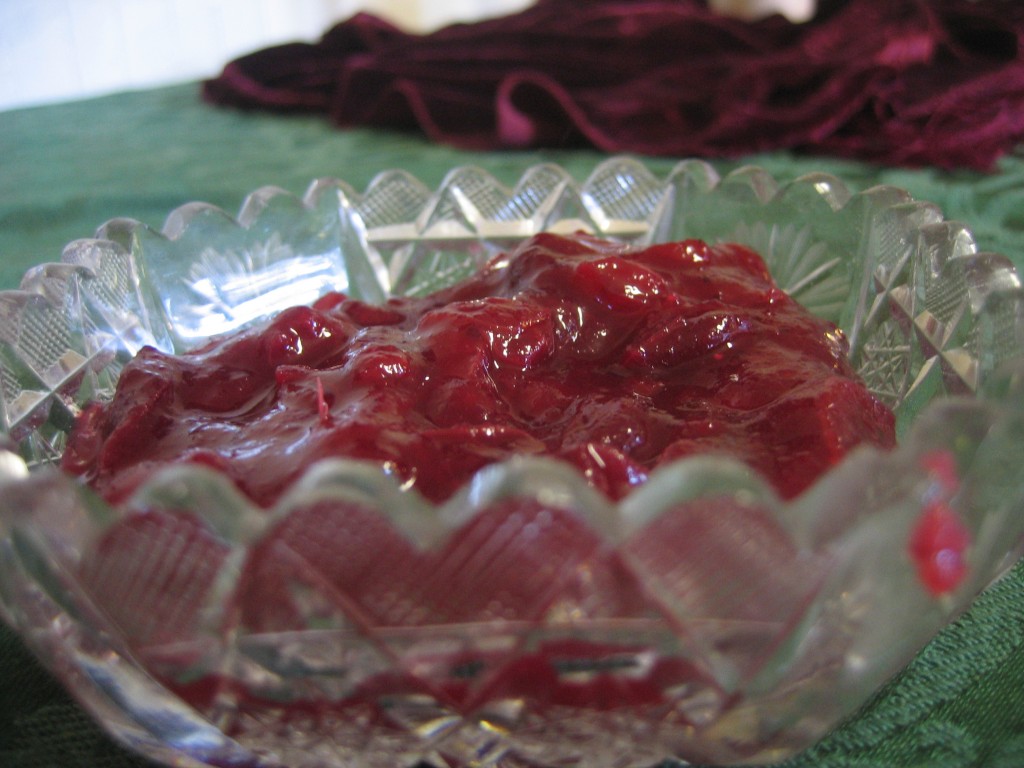
This is the classic cranberry sauce. Start here if your previous cranberry sauce experience involves a can opener. Once you’ve got the basic method down, feel free to experiment with additions. Most whole spices go well with this sauce. In fact, I can’t think of many that would not pair well with it. I’ve had it with extra cinnamon, cloves, allspice, star anise, cardamom, and even cracked black pepper. Use your taste buds’ imagination. The only thing I’d caution against is using so many spices that you drown the cranberry flavor. Continue Reading…
Posted 15 years ago at 12:58 pm. Add a comment
I love roasted vegetables. Roasting intensifies flavors instead of seeping them into water, the way boiling does. Of all vegetables that I’ve roasted, broccoli comes in second only to potatoes. Broccoli just seems to be meant for the oven. The whole stalk caramelizes and all of the little “leaves” get crispy. Add Parmesan cheese to that, and what not to love? Velveeta cannot compare. Continue Reading…
Posted 15 years ago at 12:58 pm. Add a comment
I just have one word of advise for this recipe: More. Always make more mashed potatoes than you think you’ll need. Not only are they a tasty (and thrifty) meal stretcher, but leftover potatoes can be turned into fried potato patties which are quite possibly the mother of all comfort food. Continue Reading…
Posted 15 years ago at 12:57 pm. Add a comment
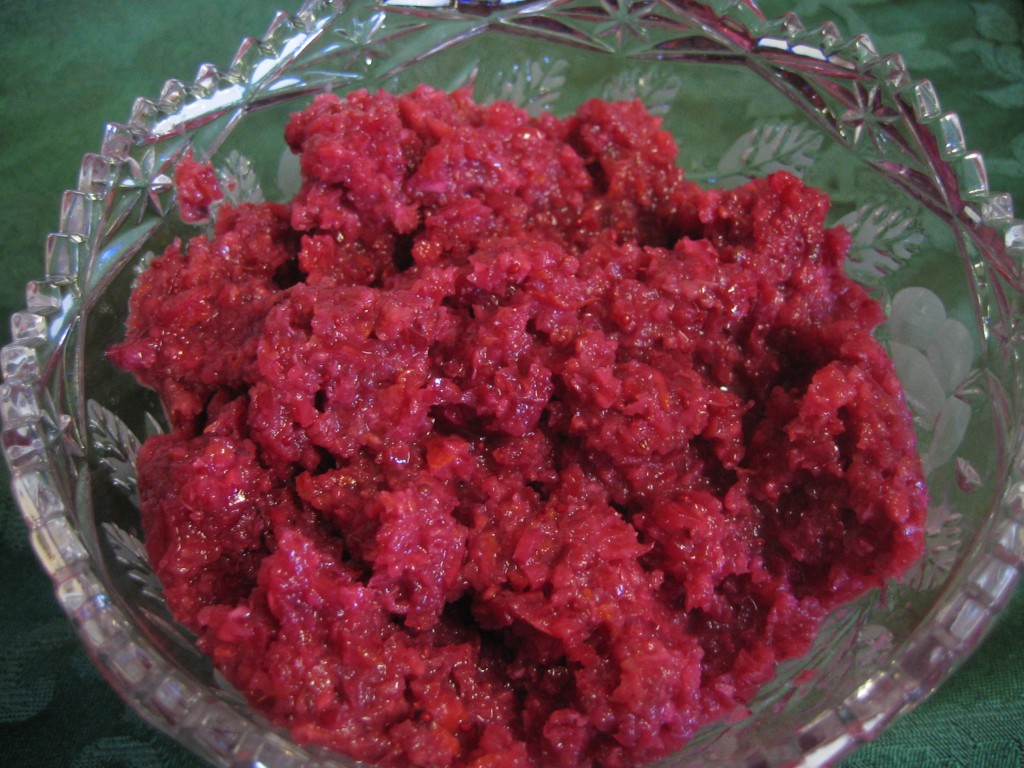
For those of you who want to twirl your culinary compasses, try this fermented recipe. Historically, most of our condiments were fermented (or cultured, or lacto-fermented- all basically the same thing)- from pickles to ketchup to soy sauce. The main goal of fermenting was preservation. Before people canned, they fermented food to keep for the winter. Fermented foods also have health benefits, including providing your digestive tract with probiotics (yep, those little things you take in expensive pill form now).
This is a great recipe to start your fermenting journey. Most people are already familiar with the tartness of cranberries and are therefore more receptive to the added fermented flavor. Continue Reading…
Posted 15 years ago at 11:22 am. 3 comments
For the fowl:
1 bird of your choice
1-3 oranges, limes, lemons, ect
1 stick of butter, divided
2 tbs of dried herbs (we used rosemary)
1-2 cloves of garlic
1 tbs oil
salt
For the gravy:
all the drippings from the bird
1/4-1/2 cup wine or vinegar
2-8 cups stock
1/2 cup water
1-2 tbs flour, cornstarch, or arrowroot powder
1-2 tbs herbs
salt
pepper
Preheat your oven to 400°. Melt butter and let cool slightly. Thoroughly thaw your bird and remove any giblets from the cavity. Either store the giblets in the fridge for later use or boil them in a pot of water for an hour to use in the gravy. Pat the bird dry with paper towels or a clean dish cloth. Place it on the rack of you roasting pan or use carrots and celery to build a rack in the bottom of your biggest baking pan, ideally one that can go on the stovetop as well. A big pot would work too, if you don’t have a burner safe pan.
Roll the oranges gently on the counter to release their juices. Cut them in half and place them in the cavity. Don’t stuff them too compactly though, or it will affect the cooking time of the bird.
In an small bowl or mortar grind the herbs. Add minced garlic, a pinch of salt, and a drizzle of oil. Gently loosen the bird’s skin with your fingers. Try not to tear it. Using your fingertips, rub the herb and garlic mixture under the skin as evenly as possible. Reserve any extra for the gravy. Skin is a barrier Then massage the bird all over with the melted butter. You can use your hands for this or a pastry brush. I prefer my hands for more even coverage. If you are using unsalted butter, you might want to sprinkle a little salt over the skin too.
When the bird is thoroughly greased, spread him out like he’s sunbathing; pull the wings and legs out from the body. This will give you crispy skin all over. If you have one, insert a probe thermometer into the deepest part of the breast, making sure to not hit any bones, which would give an inaccurate temperature. Set the alarm to go off at 160°. Put the bird in the oven and immediately reduce the heat to 350°. High heat at the beginning helps the fat essentially fry the skin as it renders. But having high heat for too long will leave the skin burnt and the meat raw.
When the breast has reached 160°, test the thigh meat on the opposite side. Remove the bird from the oven and place it on a pan or cookie sheet to rest. Use your roasting rack to keep the bottom from getting soggy. The resting period is essential. Do not skip it! Straight from the oven, all the yummy meat juices are loose. They would run out if you cut it, leaving you with dry meat. During the resting period, the meat reabsorbs the juices and leaves you with beautiful succulent meat. A turkey needs to rest at least 30 minutes, a chicken at least 10 minutes. If you are worried it will get too cold, loosely tent a piece of foil over it.
While the bird is resting, make the gravy. If you want to see the proper method to make gravy, go look it up on your favorite cooking site, because I cheat and don’t skim the fat off first. Straddle your pan over two burner and turn them on high. When things start to sizzle, which shouldn’t be too long, deglaze the pan by pour in the wine/vinegar. Using a wooden spoon, scrape up all the little brown bits. Not only are they not burned, they are incredibly flavorful caramelized juices from the meat. Believe me, you want them in your gravy! Once you have them all scraped up, add your stock. This is where you get the volume in the gravy. So, if you have a big crowd, at a lot of stock. If it’s just a few people, add less. A good guideline might be 3/4 to 1 cup per person, to allow for evaporation (and leftovers).
Next, mix your starch (flour, cornstarch, arrowroot powder) into about 1/4 cup of water. This mixture is referred to as a slurry. Adding the starch this way prevents it from turning lumpy in your gravy. Add the slurry to the gravy and mix thoroughly. Some starches take awhile to take effect, so let it simmer for a good 5 minutes before adding more. When your gravy is thickened to your liking, add a couple pinches of salt, a grind or two of fresh pepper, and any herbs (like the extra from the spice rub). Simmer for another minute to let the flavors meld. The key to good gravy is to taste early and often. Get used to how the flavors develop. Then remove to a gravy boat or other serving vessel (I use a cream pitcher). You can stick it in the oven to keep warm.
Now back to the bird. After it has rested, it’s time to carve. This takes practice! Don’t expect to do it at the table until you are more proficient at carving. The first several times you do it, expect it to be a hacked up job. Just focus on learning where the joints are and the overall process. Since a picture is worth a thousand words (and a video even more), here is a link to a video explaining how to carve a chicken.
If the worst should happen:
If you carve your bird and it is not cooked in the middle, do not panic. Simply finish carving the bird and put the pieces on an oven safe plate, cover in foil, and place it back in the oven until it’s done. You might end up with slightly drier meat, but that’s okay, because you have awesome gravy.
Posted 15 years ago at 10:48 pm. Add a comment
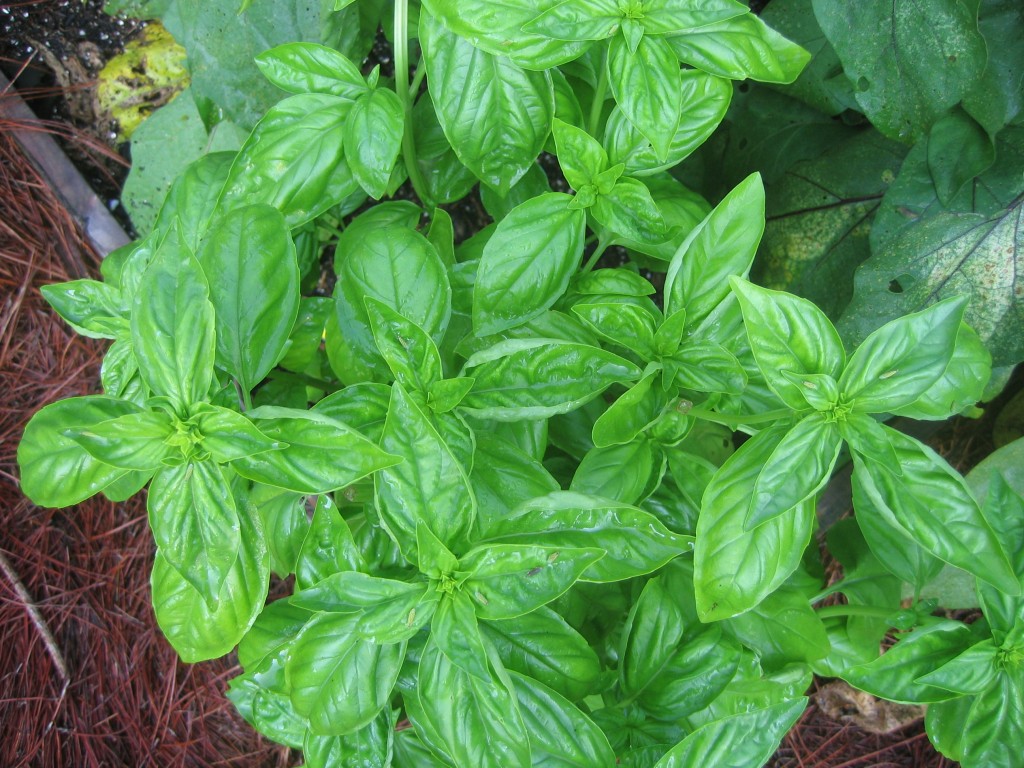
Dear Roundies,
As South Carolina shows its tropical side with muggy mornings and afternoon thunderstorms, our garden is doing well. The eggplants hang like purple comas throughout the garden, suggesting I pause in my daily labor and admire their bold, anime-like color. Most of the lettuce has bolted and is now almost as tall as me. Cucumbers hide their prickly faces behind leaves like an old man pulling the sheets over his face for a nap.
Continue Reading…
Posted 15 years, 5 months ago at 4:46 pm. 1 comment






